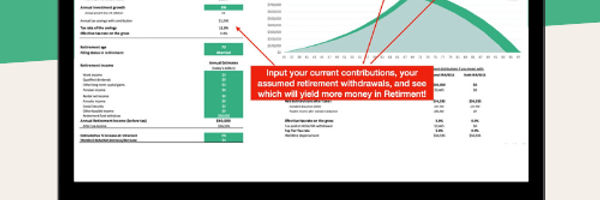To the young, it might seem crazy to create an article that talks about retirement planning in your 20s. Admittedly, to most 20-somethings, retirement is so far away that it occupies very little of their thoughts. But the reality is a time will come when these "youngsters" will retire too.
Note: Do you need to clean house before you can get to retirement? We've got you sorted. Here's your personal finance guide on life's milestones:
In fact, anyone in their 20s might have some fairly unique qualities that make retirement planning important, including:
Diminished loyalty to employers, resulting in more frequent job changes and smaller pensions.
Lower probability that Social Security will be offered when reaching their retirement years.
Income in Retirement
Today, there are three important tools the government, or an employer, supplies to help produce income in retirement. These tools include pension plans, Social Security, and retirement accounts/plans.
For many individuals in their 20s, two of these income-producing plans might not be around or nearly as generous as expected. Admittedly, there could be a program that appears to replace Social Security or Social Security itself may actually survive. But right now there is only one reliable planning tool to supply income: retirement savings accounts.
Compounding Interest
Enough of the bad news, it's time for some good news. Perhaps the most powerful factor that workers in their 20s have over those that are nearer to their retirement days is time.
Twenty-year-olds have 30 to 40 years before retirement, and that is a huge advantage over many older workers. With that much time to save money, the magic of compounding interest is on their side. To demonstrate the power of time, let's look at two examples created using our retirement savings calculator.
Retirement Savings Example
Current Age | 25 | 55 |
Desired Retirement Age | 65 | 65 |
Annual Household Income | $50,000 | $80,000 |
Anticipated Income Growth Rate | 3.0% | 3.0% |
Desired Income Replacement Rate | 70% | 70% |
Current Retirement Assets | $4,000 | $4,000 |
Expected Return on Investments | 6.0% | 6.0% |
Expected Pension at Retirement | $33,000 | $33,000 |
Social Security at Retirement | $0 | $30,000 |
Ongoing Annual Savings Required | $5,750 | $10,125 |
Some very reasonable assumptions were used in this example to demonstrate this point. The above retirement savings example demonstrates that even without the benefit of Social Security, a 25-year-old would need to save roughly half the amount that a 55-year-old would each year into a retirement account to reach their income target.

Roth IRA or 401k? This template will answer your questions.
With this template, you will get:
All DFY, simply add your details
Charts for comparison and clear answer
Easily update for any year (2023, 2024, 2025, etc…)

Retirement Savings Accounts
We've mentioned retirement savings accounts several times already in this article, without explaining exactly what is meant. By eliminating pensions and Social Security from the picture, there are only a couple of options.
Employer-Sponsored Savings Plans
Even if someone job-hops throughout their career, and they don't accrue a significant pension, they can still participate in employer sponsored retirement savings plans such as a 401(k) and 403(b) plan.
The amount an individual can contribute to each of these plans is relatively generous, and often involves an extremely valuable employer match. If an employer offers such a plan, this is usually the best savings option.
Individual Retirement Accounts
An alternative is to fund an Individual Retirement Account such as a Roth or a Traditional IRA. In fact, for individuals in their 20s, an IRA may be all that is needed to fund their retirement savings plans; if they start saving early. That's because the IRA contribution limits are relatively generous for anyone who can make 30 to 40 more annual payments into these types of plans (although there are plenty of downsides to a Roth IRA that you should know about).

Roth IRA or 401k? This template will answer your questions.
With this template, you will get:
All DFY, simply add your details
Charts for comparison and clear answer
Easily update for any year (2023, 2024, 2025, etc…)

Retirement Planning Strategies
For anyone in their 20s, retirement may seem so far out in time that it's hard to imagine that planning is even necessary. They may be preoccupied with paying off student loans if they went to college. Individuals thinking about getting married may be worried about paying for a wedding. First-time home buyers now find themselves with a new mortgage payment to make each month.
The point of this article is that starting slowly at this young age can make a big difference later on. Even a small contribution to an IRA will pay dividends in the future. So what exactly are the retirement planning strategies that anyone in their 20s can adopt?
Create a Dream: Think about the perfect home or picture the ideal job. Imagine what it feels like to be able to afford the finer things in life. Everyone needs a dream to make a dream come true.
Run Through the Numbers: Set aside some time to get a feel for the numbers. Run through some planning scenarios, so it's clear what it takes to live comfortably once retired. We have several retirement calculators that can help walk through this process.
Create a Plan: Retirement planning is something that cannot be ignored forever. Today may or may not be the right day to start saving for retirement. But there is always time for planning. Taking that first step is always the hardest because putting money aside for tomorrow may mean denying something today.

Roth IRA or 401k? This template will answer your questions.
With this template, you will get:
All DFY, simply add your details
Charts for comparison and clear answer
Easily update for any year (2023, 2024, 2025, etc…)






